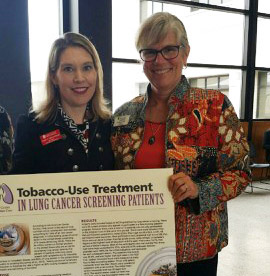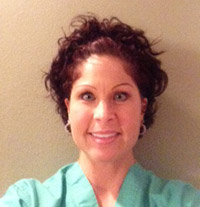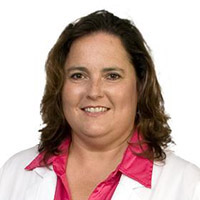First Class of Doctor of Nursing Practice Graduates Changing Health Care

Angela Stewart, left, one of the graduates being awarded the Doctor of Nursing Practice, with Kathleen Barta, associate professor of nursing.
Four women will cross the stage May 9 to pick up their Doctor of Nursing Practice degrees at the University of Arkansas general commencement exercises. It will be a day of celebration and recognition of their achievement but, possibly of even greater importance, it means better quality of health care for Arkansans.
Veterans have better access to education about making their end-of-life wishes known. Smokers have greater support in their quest to quit. Heart patients are at lower risk of experiencing abnormal heart rhythm after surgery. Screening recommendations and a new screening tool to help clinicians assess for peripheral arterial disease before symptoms are present is proposed.
That's all because, in order to earn their advanced degrees in the field of nursing, Kathy Krantz, Kathy Smith, Angela Stewart and Dee White conducted clinical capstone projects. They are using the results of their projects at the clinical settings in which they work.
The capstone is a scholarly project and the culmination of knowledge gained in the D.N.P. coursework designed to benefit a group, population, system or a community, rather than an individual, said Kathleen Barta, associate professor of nursing and graduate coordinator.
The Eleanor Mann School of Nursing in the College of Education and Health Professions offers the Doctor of Nursing Practice for B.S.N.-D.N.P. and M.S.N.-D.N.P. students with coursework delivered online through the U of A Global Campus. Students complete a clinical component in the area where they live. The nursing school began offering the D.N.P. in the fall of 2013. In addition to the adult-geriatric acute care nurse practitioner and clinical nurse specialist concentrations, a new family nurse practitioner concentration will be offered starting in the fall of 2015.
"Advance practice registered nurses who complete the D.N.P. program are prepared as leaders in the context of care," Barta said. "They engage in the scholarship of practice and impact patient outcomes through evidence-based care and policy development. They collaborate on interprofessional teams to address questions that matter to patients and clinicians and design new models of care. Nurses with practice doctorates also serve as faculty to prepare future generations of baccalaureate prepared nurses."
Kathy Krantz
 Krantz has been a nurse for 33 years. A nurse practitioner, she works as a primary care provider for the Veterans Affairs home-based program. She visits veterans who are unable to get to the primary care clinic in Fayetteville to provide medical care and ensure their needs are met in the areas of nursing, nutrition, physical therapy, social work and psychology.
Krantz has been a nurse for 33 years. A nurse practitioner, she works as a primary care provider for the Veterans Affairs home-based program. She visits veterans who are unable to get to the primary care clinic in Fayetteville to provide medical care and ensure their needs are met in the areas of nursing, nutrition, physical therapy, social work and psychology.
"It's the way of the future for members of the nursing profession to have that higher level of degree," Krantz said. "It increases the professional status of nurses, and it was a no-brainer for me when the D.N.P. program came to the U of A."
As she advanced in the nursing profession, Krantz noticed gaps in her education, such as working with a budget.
"The D.N.P. filled in every one of those gaps that a well-rounded, fully educated nurse should have knowledge about," she said.
In her capstone project, nurses discussed advanced directives with veterans and offered assistance in completing the necessary paperwork. It's too early to report results, but Krantz believes the veterans are more likely to follow through and get their wishes put in writing if nurses provide information during regular visits.
"Nurses know the patient better than any other health-care provider," she said. "It just makes sense."
Angela Stewart
Stewart works as an acute care nurse practitioner at Highlands Oncology Group in Fayetteville. The D.N.P. helps nurses translate research into practice at the patient's bedside, she said.
"It's been said that the typical lag time is 17 years for research to get to the bedside, and I want to try to cut that down," Stewart said. "The advanced degree also provides a bridge into management positions."
She implemented a comprehensive smoking cessation program for patients who undergo lung cancer screening with the goal of detecting the disease early when it is more treatable.
"Modifying behavior was one reason for doing the screening but we didn't have any face-to-face counseling with patients," Stewart said.
Of 12 patients in her project, five have stopped smoking, she said.
"A 33.3 percent quit rate is really good," she said. "By doing clinical improvement and evidence-based practice projects, we can figure out how to change something to improve outcomes for patients. It helps me look at a situation in a different way. We are delivering quality care, and we are more aware of cost-effective aspects as well."
Kathy Smith
 Smith works as an advanced practice nurse for a cardiovascular and thoracic surgical group in Fayetteville, in the operating room and clinic. She's getting her third degree from the U of A and was also in the first class when the Eleanor Mann School of Nursing started a Master of Science in Nursing program.
Smith works as an advanced practice nurse for a cardiovascular and thoracic surgical group in Fayetteville, in the operating room and clinic. She's getting her third degree from the U of A and was also in the first class when the Eleanor Mann School of Nursing started a Master of Science in Nursing program.
"The D.N.P. was very appealing to me because I have always loved nursing," she said. "But I want to be educated in a way that I can provide the best patient care but also be a great nurse leader to other nurses and other people in the health professions."
Smith studied the reliability of an assessment tool in predicting whether a patient who has had heart surgery will go into atrial fibrillation, which is an abnormal heart rhythm. She reviewed charts of patients who had been evaluated with the tool to see whether those with high risk level actually developed irregular heart rhythm. Her findings were significant, suggesting the tool, called CHADS2 score, was a reliable predictor.
"We can start doing a risk analysis on our patients prior to surgery and, if they fall into the classification considered high risk, we make a plan to treat them prophylactically to prevent atrial fibrillation from happening," she said. "Having this degree allows nurses to manage our facilities and our patients in a totally different way."
Dee White
 White, an advanced practice nurse practitioner, directs the Arkansas Heart Hospital's Peripheral Vascular Institute, which is based in Little Rock and operates 10 outreach clinics across the state. White said the same motivation drove her each time she sought more advanced education throughout her career.
White, an advanced practice nurse practitioner, directs the Arkansas Heart Hospital's Peripheral Vascular Institute, which is based in Little Rock and operates 10 outreach clinics across the state. White said the same motivation drove her each time she sought more advanced education throughout her career.
"Every time I achieved one level of practice, I saw I needed to do more to effect change so I educated myself," she said. "The D.N.P. is the evolution of that. It is the future of nursing."
White said that, despite extensive evidence suggesting that peripheral arterial disease is a widespread condition that can lead to catastrophic consequences for patients, screening for early identification is uncommon in clinical practice. She performed a statistical analysis of results from an established screening tool and found it did not produce reliable results in screening for the disease.
By applying the knowledge learned in her project, White said, the screening method can be updated to ensure that it is driven by evidence, not opinion.
The D.N.P. is one of more than 30 programs and plans offered completely or primarily online by the Fayetteville campus and showcased on the University of Arkansas ONLINE website.
The Global Campus supports U of A colleges and schools in the development and delivery of online programs and courses. It provides instructional design services, technology services and assistance with marketing, recruiting and strategic academic development.
The Eleanor Mann School of Nursing also offers a Master of Science in Nursing online and an R.N. to B.S.N. degree-completion program online as well as an on-campus Bachelor of Science in Nursing degree. The nursing school is located in the Epley Center for Health Professions, a facility that opened in 2012 with five high-fidelity simulation labs in which mannequins simulate patient conditions and offer scenarios for nursing students to address.
Topics
Contacts
Heidi Wells, director of communications
College of Education and Health Professions
(479) 575-3138,
heidisw@uark.edu
Headlines
PetSmart CEO J.K. Symancyk to Speak at Walton College Commencement
J.K. Symancyk is an alumnus of the Sam M. Walton College of Business and serves on the Dean’s Executive Advisory Board.
Faulkner Center, Arkansas PBS Partner to Screen Documentary 'Gospel'
The Faulkner Performing Arts Center will host a screening of Gospel, a documentary exploring the origin of Black spirituality through sermon and song, in partnership with Arkansas PBS at 7:30 p.m. Thursday, May 2.
UAPD Officers Mills and Edwards Honored With New Roles
Veterans of the U of A Police Department, Matt Mills has been promoted to assistant chief, and Crandall Edwards has been promoted to administrative captain.
Community Design Center's Greenway Urbanism Project Wins LIV Hospitality Design Award
"Greenway Urbanism" is one of six urban strategies proposed under the Framework Plan for Cherokee Village, a project that received funding through an Our Town grant from the National Endowment for the Arts.
Spring Bike Drive Refurbishes Old Bikes for New Students
All donated bikes will be given to Pedal It Forward, a local nonprofit that will refurbish your bike and return it to the U of A campus to be gifted to a student in need. Hundreds of students have already benefited.




